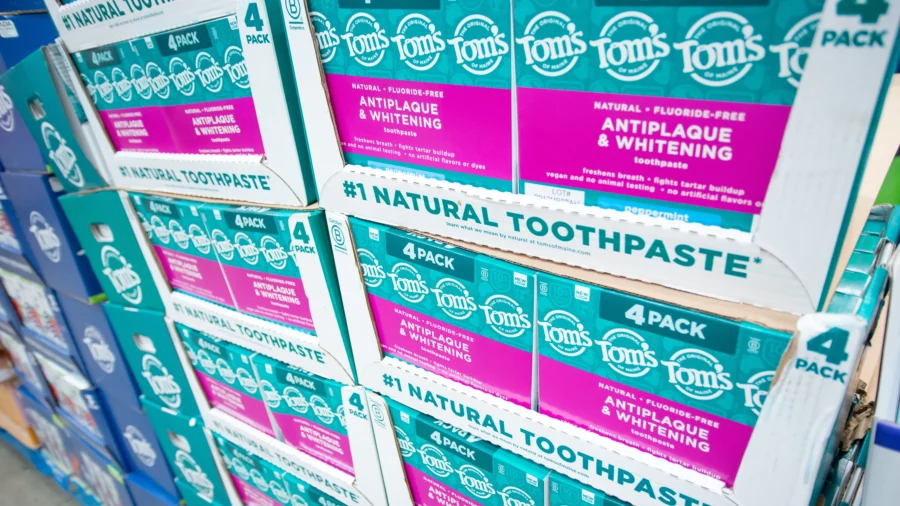An inspection of a Tom’s of Maine toothpaste manufacturing facility in Sanford, Maine, found bacteria in water used to make toothpaste and the presence of “a black mold-like substance” near manufacturing equipment.
On Nov. 5, the Food and Drug Administration (FDA) issued a warning letter to the parent company Colgate-Palmolive, outlining “significant violations of Current Good Manufacturing Practice (CGMP) regulations for finished pharmaceuticals” after conducting an inspection of the facilities from May 7 to 22, 2024.
The company tested several water samples from June 2021 to October 2022 in which it recovered the bacteria Pseudomonas aeruginosa, with the water used to make products such as “Tom’s Simply White Clean Mint Paste” and for the final rinse of numerous equipment cleaning processes.
According to the Centers for Disease Control and Prevention (CDC), Pseudomonas aeruginosa is a group of bacteria that can cause infections in the blood, lungs, urinary tract, or other parts of the body after surgery.
The letter stated that the company reported multiple incidents where amounts of the bacteria Ralstonia insidiosa that were “too numerous to count” were found during water testing.
“Water is a major ingredient in many of your OTC drug products,” the FDA stated in its letter. “It is essential that you employ a water system that is robustly designed, and that you effectively control, maintain, and monitor the system to ensure it consistently produces water suitable for pharmaceutical use.”
The letter reports that a gram-negative bacteria, cocco-bacilli Paracoccus yeei, was found in a batch of the company’s Wicked Cool! Anticavity Toothpaste. The Hartman Science Center reports that the bacteria is associated with several infections, including peritonitis, conjunctivitis, and bloodstream infections. The CDC states that gram-negative bacteria can cause serious infections in health care settings.
Tom’s of Maine determined the bacteria was “due to sample contamination,” and released the batch after retesting, according to the letter—an action the FDA said was carried out “without sufficient justification.” The FDA noted that although the company said the root cause for the detection of P. yeei was “laboratory error,” no lab errors were identified in the initial investigation.
“Your response is inadequate. It does not include additional supporting evidence or testing results for the finished products,” the FDA said.
The inspection also found that Tom’s of Maine “failed to maintain buildings used in the manufacture, processing, packing, or holding of drug products in a good state of repair.”
An FDA investigator also observed “a black mold-like substance” at the base of a hose reel and behind a water storage tank at the facility, with the substance found within a foot of manufacturing equipment used for toothpaste production.
The letter noted that the company said the black substance was thoroughly removed but that the area it was located in is susceptible to “moisture accumulation and in a hard-to-clean area.”
The investigator “also observed powder residues at a stainless-steel tray” near a batch of Tom’s Silly Strawberry anticavity toothpaste.
“It is essential that your facility is in a good state of repair and sanitary conditions are maintained to protect drug products from potential routes of contamination,” the letter warned.
The agency requested that the company provide a detailed assessment of the design and control of manufacturing operations, a detailed risk assessment addressing the hazards posed by distributing over-the-counter drug products, investigations into all batches of products with potential microbial contamination, microbiological batch release specifications for all drug products, all chemical and microbial test methods, and a summary of results from testing reserve samples of all drug product batches within expiry.
The company was given 15 days to respond and to specify any remediation work in response to the violations.
Tom’s of Maine, which is owned by Colgate-Palmolive, told NTD in an emailed statement that they are “working with the FDA and are remedying the issues raised in their May inspection of the Tom’s toothpaste manufacturing plant in Sanford, Maine.”
“We have always tested finished goods before they leave our control, and we remain fully confident in the safety and quality of the toothpaste we make. In addition, we have engaged water specialists to evaluate our systems at Sanford, have implemented additional safeguards to ensure compliance with FDA standards, and our water testing shows no issues. We are also making capital investments as part of an ongoing, significant upgrade of the Sanford plant’s water system. Tom’s is committed to making safe and effective natural products for our consumers, and to maintaining the trust in our brand,” the statement said.

